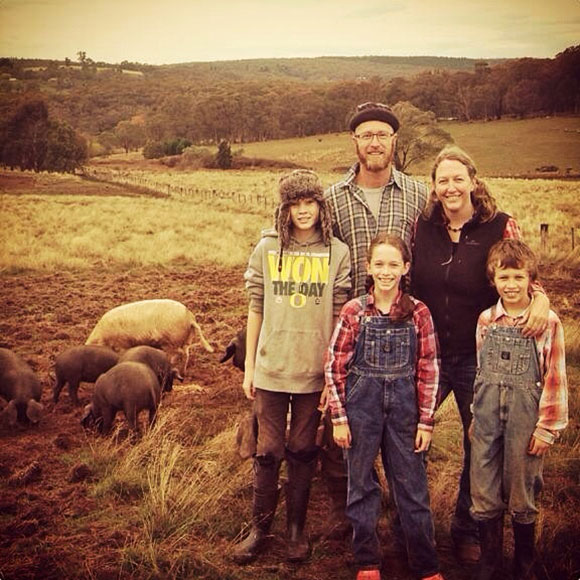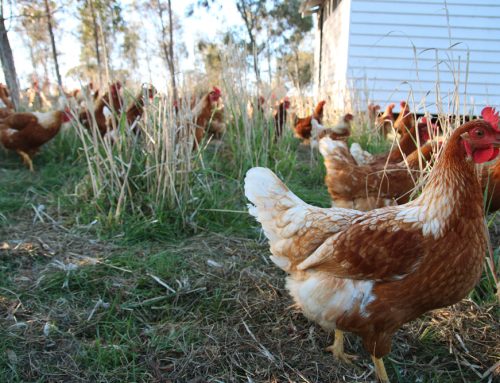Take two agriculturally innovative adults and their three children, a farm on the edge of the town of Daylesford, Victoria, and up to 130 heritage breed, Large Black variety pigs.
Mix it with a small herd of Lowline cattle, some rare breed Lincoln sheep and mix of chooks including Isa Browns, Araucanas, Speckled Sussex, Marans, Pekin Bantams, and Anconas. Add effective management of the region’s rich volcanic soil, some clever direct farm-to-eater marketing and an ethical approach to producing animals for food, and you have Jonai Farms.
Jonai is one of a number of family farms around the country that are developing a different and better approach to producing what we eat.
In her blog, farmer Tammi Jonas describes how the family left their suburban Melbourne home and ended up at Daylesford after a detour to the US where they visited Joe Salatin’s farm, among others where ethics were being introduced to farm life. Salatin has made a number of speaking and training visits to Australia and his farming system has become known to Australian farmers seeking new ways in a competitive and, to small family farmers, often an unfair market.
I started by talking to Tammi about life on Jonai Farms and what is involved in the cycle of farm work. Are there times of peak activity, I asked?
Tammi: Pretty much every day on a free-range pig farm and meatsmith is peak time.
Pigs can’t sweat, so ensuring they have sufficient access to water and wallows (a puddle where pigs can cool themselves in water) is critical in summer, so we’re out there a few times a day in hot weather, and of course they must be fed daily no matter the weather. In winter the pigs are more comfortable and at less risk, but then they turn the paddocks quickly as they’re voracious diggers, gaining around 20 percent of their nutrition from the soil, roots and grubs they find. Moving them frequently is important for optimum soil health.
We slaughter fortnightly and do one metropolitan delivery to our community supported agriculture (CSA) scheme hubs around Melbourne once a month, and to regional hubs (Castlemaine, Woodend and Ballarat) on the alternate fortnight each month.
Fortnightly slaughters and deliveries mean we’re busy butchering for primes, curing bacon and ham and making sausages each week as well.
We also slaughter one steer a month to include in our CSA boxes so, of course, that’s more butchering time.
Processing meat on our farm was made possible when we became the first farm in Australia to crowdfund infrastructure — $27,570 through Australian crowdfunding site, Pozible. We used that to construct our own butcher’s shop here on the farm and now do our own butchering in the converted, refrigerated container licensed as Jonai Meatsmiths.
There are also twice weekly runs to collect spent brewers’ grain from Holgate Brewhouse in Woodend. Evenings are best for writing newsletters and responding to orders, and one weekend a month we run workshops on basic butchery, curing and sausage making, plus a couple of Salami Days each winter.
It’s a full life!
Russ: I won’t ask you about spare time because it appears that might be in short supply, but what about marketing your farm products? How do you go about that?
Tammi: We do all direct sales — no middlemen. We sell to households mostly through deliveries to hubs, a couple of restaurants including the award-winning Lake House in Daylesford, and from the farm gate now that we have the butcher’s shop on farm.
‘Ethical pork and beef shares’ are what we call the meats we supply through our CSA scheme. The CSA provides a direct link to eaters, much like those supplying fresh fruit, vegetables and groceries do, and people subscribe and have their boxes delivered to hubs in the city. You can find out more on our website http://www.jonaifarms.com.au/csa/
Russ: Your life on the farm sounds incredibly busy and you seem to have established a rhythm of activity to make it happen. But what about the challenges you face in making this livelihood work? Do you do much off-farm work, like many farming families do, to remain viable?
Tammi: I suppose the challenges for us are different than for some who are caught up in long supply chains. We benefited from the wisdom of those who’ve gone before us and set out to run a miniscule supply chain, working directly with our community of ethical omnivores to meet their needs as well as ours, and to include education and outreach as intrinsic to our business plan, both philosophically and financially.
We are solely reliant on farm income now and are delighted to be able to say that we’re viable.
When it comes to challenges facing other farmers, for some I think it’s access to the market that wants their food and for many small livestock farmers it’s access to affordable, reliable butchery.
Our story shows how we’ve tackled it — we’ve always communicated with our community and never had problem accessing those who want ethically-raised meat, and when we had trouble with butchery we built a butcher’s shop with the support of wonderful people who crowdfunded us while I learned to be a butcher.
The other issue for us small producers is labour — our kids are increasingly taking on small but significant roles to help us run this complex and deeply satisfying family venture.
Russ: Someone said to me that you practice something called ‘radical transparency’ in your farming operation. What is this?
Tammi: Radical transparency… it means you could drop in and ask to see the pigs at any time and we’d say, ‘welcome!’
It means when you ask what’s in your sausages, we can tell you right down to the brand of salt, as we make it all ourselves.
It means if we make a mistake we blog it or go on national radio and seek feedback from eaters and growers everywhere on how we can do things better.
I think of it as a sort of intentional self-surveillance — the panopticon effect — where knowing we’ve invited the world to watch our practices helps drive us towards the most defensible, ethical behaviour at all times.
Russ: You seem to have met your challenges by developing your own specialist supply chain, connecting directly with your eaters. I guess maintaining that is an ongoing challenge, but what about the opportunities you see?
Tammi: The greatest opportunity for us is to use the voice we have from our work as ethical farmers to help shape a food sovereign future for Australia and the world.
Part of doing this was our working with others to set op a new farmer organisation — Fair Food Farmers United (FFFU).
There’s a need for a collective voice for farmers selling into the domestic market, and in particular those engaging with the question of ‘what is fair food’ and ‘how can I be sure I’m growing it and supporting my family doing so?’
I’m a spokesperson for FFFU and delighted to be part of the exciting fair food movement sweeping Australia and the world. I see myself as a connector to help bring us together to figure out how best to support each other in our efforts to feed Australia fairly.
Find more about Tammi and her family farm and its products here: http://www.jonaifarms.com.au/about/
https://afsa.org.au/blog/2014/03/03/fair-food-farmers-united/
Author: Russ Grayson is a journalist and editor with a background in agricultural food security and training projects in the south west Pacific and a consultant to local government on civic agriculture.


